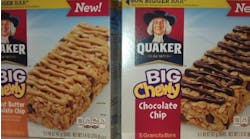Food marketing class actions and "mass actions" (otherwise known as multidistrict litigations or "MDLs") have seen a recent and significant rise. MDLs alone have increased by 50% increase in only the last month or so, and more are simmering in the kitchen right now.
A group of federal judges (the JPML or Panel) decides which multiple federal cases, many of which are class actions, will be combined into a single MDL proceeding. After their most recent session in late May, this Panel created MDLs for three new groups of cases arising from the allegedly false marketing claims of food manufacturers. These new MDLs involved:
- The meaning of a "footlong" submarine sandwich (Regarding Subway's Footlong Sandwich Marketing and Sales Practices Litigation)
- The "no crash" effect of an energy drink (Regarding 5-Hour Energy Marketing and Sales Practices Litigation)
- The alcohol content in various beer products (Regarding Anheuser-Busch Beer Labeling Marketing and Sales Practices Litigation)
- The marketing of bean dip and chips as "All Natural" when they were purportedly made from genetically modified organisms (GMOs) (Regarding Frito-Lay North America, Inc. "All Natural" Litigation)
- The marketing of drinks as a healthy alternative to soft drinks when they purportedly contained almost as much sugar as soft drinks (Regarding Glaceau Vitaminwater Marketing and Sales Practices Litigation)
- The marketing of milk fortified with DHA Omega-3 as supporting "brain health" in children and adults (Regarding Horizon Organic Milk Plus DHA Omega-3 Marketing and Sales Practices Litigation)
- The marketing of not-from-concentrate "100% Pure Squeezed Orange Juice" when the juice was purportedly extensively processed (Regarding Simply Orange Juice Marketing and Sales Practices Litigation)
- The marketing of not-from-concentrate "100% Pure and Natural Orange Juice" when the juice was purportedly extensively processed (Regarding Tropicana Orange Juice Marketing and Sales Practices Litigation)
- The marketing of oils as "100% Natural" when the oils purportedly contained GMOs (Regarding Wesson Oil Marketing and Sales Practices Litigation)
Lori Leskin is Partner and Co-Head of Kaye Scholer's Product Liability Practice and is based in the firm's New York office. She is valued by her clients for her ability to successfully assess, strategize and implement unique solutions to their unique problems. Lori handles all aspects of litigation strategy for complex nationwide and multidistrict litigations involving a variety of products. She is also Co-Chair of the Products Liability Committee of the American Bar Association's Section of Litigation. She can be reached at [email protected].
Alan Rothman is the coordinating attorney for the Kaye Scholer's Product Liability Practice and is based in the firm's New York office. For more than a decade, he has counseled clients in various industries with respect to issues relating to removal of cases to federal court as well as practice and procedure before the Judicial Panel on Multidistrict Litigation, including appearing before the Panel on oral argument and other motion practice. He can be reached at [email protected]
And there may be more yet to come. At its next hearing in late July, the Panel is scheduled to hear two additional petitions to create an MDL arising from the marketing of retail food products, including:
- The marketing of cereal as "natural" when the cereal purportedly contained GMO soy (Regarding Kashi Company Marketing and Sales Practices Litigation)
- The marketing of "100% Pure Olive Oil" which purportedly was made from leftover olive skins and pits (olive-pomace oil) (Regarding Capatriti Brand Olive Oil Marketing and Sales Practices Litigation)
Next Steps in Food Marketing
All of this information about MDLs can certainly be a lot to digest. Court rules give plaintiffs much leeway in pleading their claims, giving them every benefit of the doubt to find that claims are adequately asserted.
So what are food manufacturers (and their advertisers) to do? In a nutshell, the lesson to be learned from this increasing trend towards litigation is that calling something "natural," "healthy" or "foot long" is not something that can be done lightly, without someone possibly pulling out a literal or figurative tape measure.
Advertising claims that food are "natural" or "pure," or that they contain "healthy" ingredients may be technically correct. Federal regulations and industry practice may permit certain labeling and advertising claims to be made. And in the highly competitive market place, the need to attract consumers makes it very tempting to rely on such claims.
However, the recent spate of litigation warns against being too literal in advertising. Words may have a technical meaning, but in the realm of consumer products, food manufacturers and advertisers have to put their consumer hat on and consider how those same terms are likely to be interpreted by the lay person.
Much of the effort to guard against such litigation is common sense:
- Make sure your product contains the ingredients you claim they do.
- Review your advertising claims to determine whether they are correct not only in fact but in spirit.
- Clarify or limit the claims being made if necessary.
- Confirm that that scientific claims being made about any health benefits to your product or its ingredients are supported by actual science and that the science can be fairly applied to your product.
Food manufacturers must be certain that their labels, and the science, will legally justify any literary leaps their advertising or marketing campaigns may make. The purity of a product's ingredients must be carefully monitored.
While creativity is important, the words used in marketing and ad campaigns need also to be thought of as technical terms, to be applied carefully with a firm basis in the product's nutritional content and ingredients, and with outside advice and formal risk assessments as necessary.
In this environment, where the kitchen for food industry lawsuits is heating up, it is more critical than ever for food manufacturers and marketers to proactively consider the meaning of words from all angles before being "consumed" by protracted and costly litigation.

